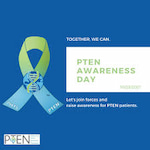PTEN Awareness Day Date in the current year: October 23, 2026
 PTEN Awareness Day, also known as PTEN Hamartoma Tumor Syndrome Awareness Day, is observed on October 23. It was created to raise awareness of mutations in the PTEN gene that can cause various tumors.
PTEN Awareness Day, also known as PTEN Hamartoma Tumor Syndrome Awareness Day, is observed on October 23. It was created to raise awareness of mutations in the PTEN gene that can cause various tumors.PTEN is a so-called tumor suppressor gene. It encodes the enzyme of the same name, which regulates cell growth, survival, and metabolism. Mutations in this gene affect cell proliferation and are associated with PTEN hamartoma tumor syndromes (PHTS), also known as multiple hamartoma syndromes.
Hamartomas are benign tumors composed of an abnormal mixture of cells and tissues normally found in the affected organ but arranged in a disorganized way. PHTS is characterized by numerous hamartomas in different tissues. PHTS is an umbrella term for several genetic conditions, including Cowden syndrome, Lhermitte-Duclos disease, Bannayan-Riley-Ruvalcaba syndrome, Proteus syndrome, and Proteus-like syndrome.
Although hamartomas are benign by definition, people with PHTS are often predisposed to developing cancer in the affected tissues. PTEN mutations are known to increase the risk of several major types of cancer, including breast cancer, uterine (endometrial) cancer, prostate cancer, glioblastoma, thyroid cancer, melanoma, and colorectal cancer.
The PTEN protein is also important for brain function. Therefore, PTEN mutations can cause autism spectrum disorders. Individuals with ASD linked to PTEN mutations may experience developmental delays, intellectual disability, social and/or communication difficulties, and sensory sensitivities. They often have macrocephaly, or an abnormally large head.
Although hamartomas are usually benign, their location and size can cause significant health issues. For instance, brain hamartomas, such as hypotalamic hamartomas, can cause seizures, hormonal imbalances, developmental delays, and precocious puberty. Hamartomas in the lungs (pulmonary hamartomas) can cause a persistent cough, chest pain, and obstructive pneumonia. Hamartomas in the kidneys (renal hamartomas) can contribute to hypertension or renal impairment. Skin hamartomas are primarily a cosmetic concern, but they can become infected or ulcerate.
Since patients with PHTS have multiple hamartomas in different organs, they usually have to deal with multiple health issues. While most hamartomas can be treated surgically, surgery may not be necessary if the hamartomas are small or slow-growing, and symptoms can be effectively alleviated with medication. Patients with asymptomatic hamartomas require monitoring for symptoms and potential complications.
In addition to the surgical or conservative treatment of symptomatic hamartomas, individuals with PHTS typically require lifelong surveillance for cancer. Those with ASD associated with PTEN mutations may benefit from early developmental and behavioral interventions.
PTEN Awareness Day was created to educate the public about PTEN mutations and PTEN hamartoma tumor syndrome. The day also highlights the importance of early diagnosis and continued research into finding more effective treatments and, ultimately, a cure.
- Category
- International Observances
- Tags
- PTEN Hamartoma Tumor Syndrome Awareness Day, PTEN Awareness Day, international observances, awareness days, rare diseases